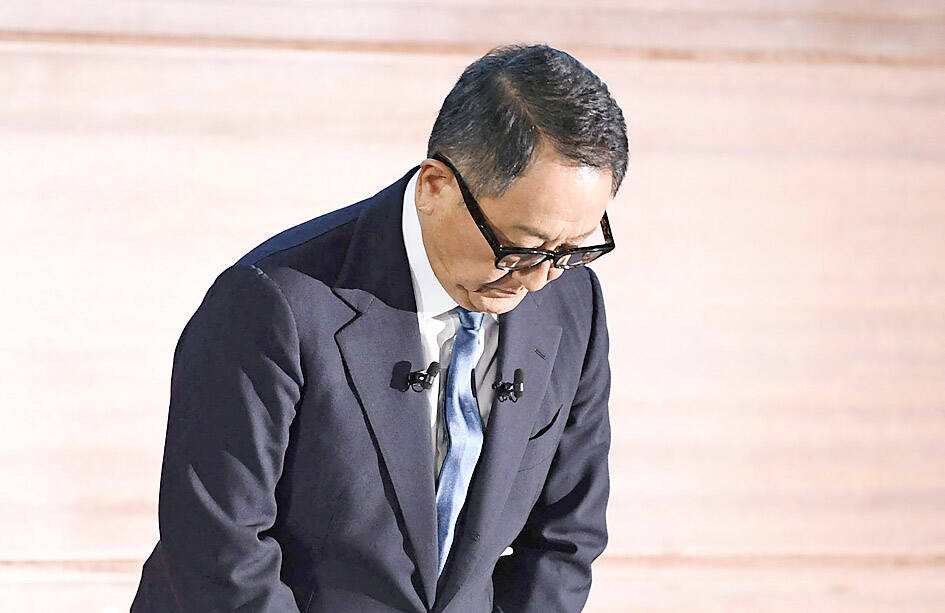Toyota Motor Corp chairman Akio Toyoda yesterday said he was “ashamed” of recent scandals involving subsidiaries of the Japanese auto giant, as the firm announced record vehicle sales of 11.2 million across its brands last year.
The bumper figure — an industry record — allowed Toyota to retain its position as the world’s top-selling automaker for the fourth successive year, thanks to a recovery in demand and easing chip shortages.
Taking only the Toyota and Lexus brands, global volume sales totaled 10.3 million units, but growth fell for Daihatsu Motor Co, which builds mini-vehicles and is embroiled in a rigged safety test scandal.

Photo: Kyodo via Reuters
Truck and bus maker Hino Motors Ltd, which has also been hit by a scandal related to rigged tests of its engines in Japan, saw volume sales sink almost 10 percent.
It came a day after Toyota said it was suspending shipments of 10 models that use diesel engines linked with testing irregularities at an affiliate, Toyota Industries Corp.
Toyoda bowed in apology at a press conference and said he was ultimately responsible for the misconduct.
“I deeply apologize for the repeated wrongdoings by Hino Motors, Daihatsu Motor and Toyota Industries that have caused troubles and worries to customers and stakeholders,” he told reporters.
“They lost sight of the values and priorities that should have been upheld,” he said, adding that he was “ashamed” of the situation.
“It will take time to recover the trust back from our customers,” Toyoda said, promising to lead a “transformation.”
Toyota’s total vehicle sales figure was a jump of 7.2 percent from a year earlier and compares with 9.2 million for Germany’s Volkswagen Group, whose unit sales soared 12 percent.
South Korea’s Hyundai-Kia Group retained third place last year with 7.3 million units sold, up 6.7 percent.
Toyota attributed its performance to “solid demand in each region, in addition to easing chip shortages in each region.”
However, in terms of market value, Elon Musk’s US electric vehicle (EV) maker Tesla Inc remained No. 1.
Toyota last year sold just 104,018 EVs — a fraction of the 1.81 million for Tesla and 1.57 million for China’s BYD Co (比亞迪).
The company has said that by next year it plans to have an electrified version for every Toyota and Lexus model globally, and aims to sell 1.5 million EVs annually by 2026 and 3.5 million by 2030.
Yesterday’s figure combined sales for the Toyota, Lexus, Daihatsu and Hino brands, and beat Toyota’s own previous record of 10.7 million set in 2019, the year before it overtook Volkswagen.
Volkswagen’s 2019 unit sales of 10.97 million was the previous industry record.

Semiconductor business between Taiwan and the US is a “win-win” model for both sides given the high level of complementarity, the government said yesterday responding to tariff threats from US President Donald Trump. Home to the world’s largest contract chipmaker, Taiwan Semiconductor Manufacturing Co (TSMC, 台積電), Taiwan is a key link in the global technology supply chain for companies such as Apple Inc and Nvidia Corp. Trump said on Monday he plans to impose tariffs on imported chips, pharmaceuticals and steel in an effort to get the producers to make them in the US. “Taiwan and the US semiconductor and other technology industries

SMALL AND EFFICIENT: The Chinese AI app’s initial success has spurred worries in the US that its tech giants’ massive AI spending needs re-evaluation, a market strategist said Chinese artificial intelligence (AI) start-up DeepSeek’s (深度求索) eponymous AI assistant rocketed to the top of Apple Inc’s iPhone download charts, stirring doubts in Silicon Valley about the strength of the US’ technological dominance. The app’s underlying AI model is widely seen as competitive with OpenAI and Meta Platforms Inc’s latest. Its claim that it cost much less to train and develop triggered share moves across Asia’s supply chain. Chinese tech firms linked to DeepSeek, such as Iflytek Co (科大訊飛), surged yesterday, while chipmaking tool makers like Advantest Corp slumped on the potential threat to demand for Nvidia Corp’s AI accelerators. US stock

The US Federal Reserve is expected to announce a pause in rate cuts on Wednesday, as policymakers look to continue tackling inflation under close and vocal scrutiny from US President Donald Trump. The Fed cut its key lending rate by a full percentage point in the final four months of last year and indicated it would move more cautiously going forward amid an uptick in inflation away from its long-term target of 2 percent. “I think they will do nothing, and I think they should do nothing,” Federal Reserve Bank of St Louis former president Jim Bullard said. “I think the

SUBSIDIES: The nominee for commerce secretary indicated the Trump administration wants to put its stamp on the plan, but not unravel it entirely US President Donald Trump’s pick to lead the agency in charge of a US$52 billion semiconductor subsidy program declined to give it unqualified support, raising questions about the disbursement of funds to companies like Intel Corp and Taiwan Semiconductor Manufacturing Co (台積電). “I can’t say that I can honor something I haven’t read,” Howard Lutnick, Trump’s nominee for commerce secretary, said of the binding CHIPS and Science Act awards in a confirmation hearing on Wednesday. “To the extent monies have been disbursed, I would commit to rigorously enforcing documents that have been signed by those companies to make sure we get